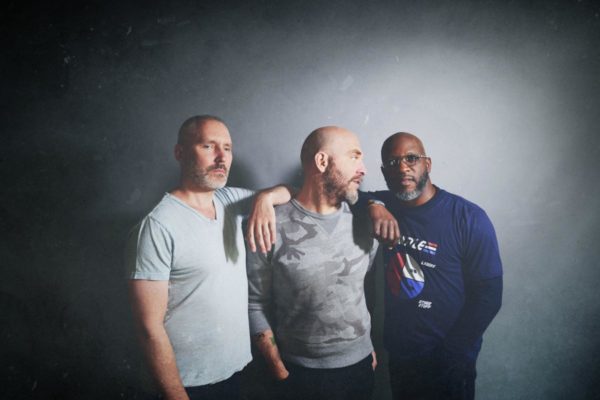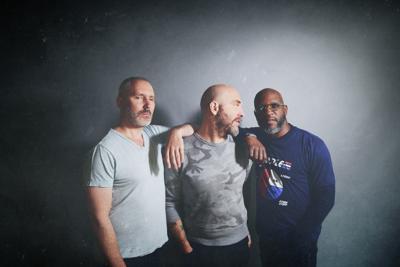The Bad Plus, always a jazz outlier, silences doubters by launching a new chapter

From left: Reid Anderson, Dave King and Orrin Evans of the Bad Plus
Photo by Shervin Lainez
Shervin Lainez
Jazz trio the Bad Plus has a tradition of playing a set of early-January gigs at the Ferring Jazz Bistro that dates back to the mid-2000s. But 2018 marked a new beginning for the group — sort of.
Pianist Orrin Evans joined founding band members Reid Anderson (bass) and Dave King (drums) in the long-running outfit, replacing Ethan Iverson, who left in December 2017. It was the new lineup’s first public performances, and, if that alone didn’t generate enough pressure, the shows were being recorded for broadcast on NPR’s “Jazz Night in America.”
“The headline was that, yeah, it sounds different, but it’s still the Bad Plus,” Anderson says by phone from the streets of Brooklyn — or shouts, rather, as ambulance sirens scream an avant-garde symphony behind him for the full length of the conversation.
“We all felt the pressure of expectations,” he says. “Of promoters and others who were saying, ‘Well, let’s see how this works,’ you know? However, I do feel that the doubters have been pretty much silenced.”
The Bad Plus has been a going concern since the turn of the century, and though the change in personnel generated degrees of both excitement and concern, the band’s legacy formed a solid base from which to launch its next chapter.
“The music of the Bad Plus, it’s based on composition and concept,” Anderson says. “We’re not just a band playing random music. We have a specific, curated body of work, most of it generated by me and Dave.”
The fact that all of the band members write — and that includes Evans, who contributed two pieces to the group’s 2018 album, “Never Stop II,” which was released the same day as the Bistro gig, and two on its latest release, “Activate Infinity” — is one of the things that makes the Bad Plus a jazz outlier.
Another is that it’s a band at all. Usually in jazz, there’s a discernible leader who is joined by sidemen/women who come and go as varying schedules and paychecks warrant.
“People have to pay their rent,” Anderson says. “You get a band together, and somebody gets a call to do a tour that’s gonna pay their rent, and that’s the end of the band.”
The Bad Plus, on the other hand, defied the conventional wisdom and turned down those sideman gigs, sticking together even if it meant playing for next to nothing.
Eventually, Anderson, King and Iverson got signed to Columbia Records, and their commitment paid off. And it continues to do so — for the group as it moves on with Evans at the keys and for Iverson, who returned to his solo career.
Making “Activate Infinity” was a much different experience than “Never Stop II,” Anderson admits. The latter record was made while the new lineup was just rehearsing and had not yet performed live. The new one “was a lot more off-the-cuff. It was a very easy record to make,” he says.
“We didn’t really have an agenda. We went in with a few tunes, and we were certainly feeling the experience of performing together for over a year. There’s a place (where) that can take you that nothing else can — just playing together night after night and getting to know the music and know each other.”
Two numbers on the new album are reworked from previous versions. King’s “Thriftstore Jewelry” originally appeared on the Bad Plus’ “Prog” in 2007, and Anderson’s “Love Is the Answer” was on the group’s 2001 self-titled debut (also known as “Motel”).
“It was mostly that we just enjoyed the way they were sounding with Orren — the different kind of energy they had — and we wanted to document that,” Anderson says.
What you won’t hear on the new album are any cover songs. On previous works, the Bad Plus gained a fair amount of attention for daring, ear-catching versions of Nirvana’s “Smells Like Teen Spirit,” Rush’s “Tom Sawyer” and David Bowie’s “Life on Mars,” among others. Anderson’s swan song with the group, “It’s Hard” (2016), was entirely made up of covers.
But Anderson chafes at the notion that that’s how some people perceive the band.
“We did do a certain amount of that,” he says. “However, the idea that that was in any way the majority of the band’s output is 100% fake news.”
You still might hear the occasional cover tune, he allows, but “it’s just not a focus for us anymore.”
Nor has it ever been, he insists.
“If you ever saw the Bad Plus in the last 20 years, you would not go away saying, ‘They play a bunch of covers.’ We’d do maybe one or two a set.”
But they do play. A lot. The Bad Plus is one of the hardest-touring jazz acts around, and Anderson says he appreciates situations like the band’s long-running relationship with the Bistro, where fans have returned to see the band time and again.
“I always say this; I think it’s so important: This music — you know, jazz in general — it needs fans,” he says. “There are a lot of people who are casually interested in jazz and say, ‘Yeah, I like jazz.’ But that’s not fandom as far as I’m concerned. Fandom is people who know your music, who come and see you when you’re playing. And part of building that is being on the road as much as we are.”
What The Bad Plus • When 7:30 and 9:30 p.m. Wednesday-Saturday, 2 and 6:30 p.m. Sunday • Where Ferring Jazz Bistro, 3536 Washington Boulevard • How much $10-$36 • More info 314-571-6000; jazzstl.org








